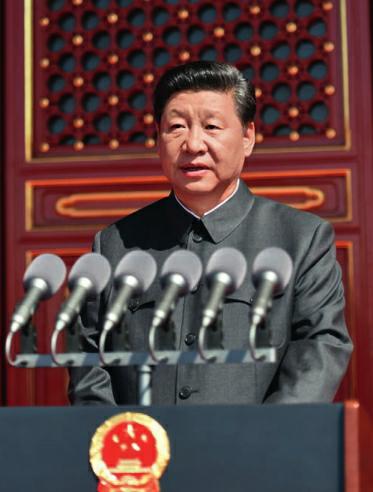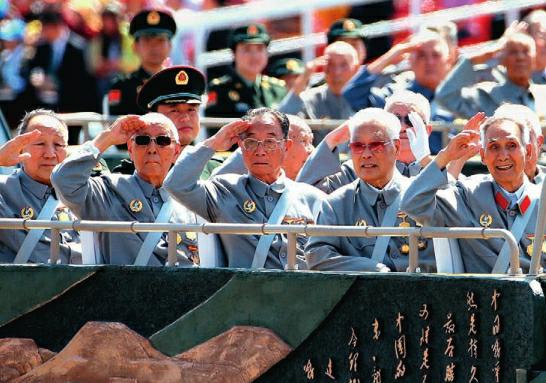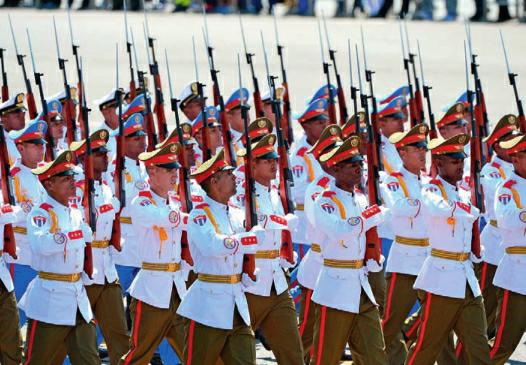V-Day Parade Commemorates 70th Anniversary of the Chinese People’s War of Resistance Against Japanese Aggression
ON September 3, Beijings Tiananmen Square staged Chinas largest-scale military parade since the founding of the Peoples Republic of China, to commemorate the 70th anniversary of victory in the Chinese Peoples War of Resistance against Japanese Aggression and the world anti-Fascist war. Twelve thousand service personnel trooped in the ceremony as Chinese President Xi Jinping called on all present to bear history in mind, honor those who laid down their lives in the war against foreign aggression, cherish peace, and ensure that this historical tragedy never recurs. President Xi said that in the interests of peace China will remain committed to peaceful development and to upholding the outcomes of the Chinese Peoples War of Resistance Against Japanese Aggression and the world antiFascist war. In a surprise move he then announced Beijings plan to shed 300,000 troops.
Sixty-five heads of state from five continents, other senior government figures, and representatives of international and regional organizations attended the V-day parade, while 11 countries dispatched marching formations. Representative teams from six countries also attended this martial gala.
China, Main Theater of the World Anti-Fascist War
On the occasion of this grand parade, in addition to Xis admonition to remember history and never allow the recurrence of such a historical tragedy, the review was also of signal significance in reinvoking Chinas great contributions to winning the world anti-Fascist war and Chinas crucial sacrifices as the frontline in the Far-Eastern theater of this war.
In the course of that devastating conflagration, as President Xi observed in his address, the war in China against Japanese aggression started the earliest and lasted the longest. Despite the grievous national toll the war exacted, the Chinese nation stood fast in an epic contribution to world victory.
For 10 years before the outbreak of the Pacific War, China had fought alone fiercely against the forces of the Japanese aggressors, hobbling attempts of the Japanese Fascists inroads into other countries. When the Pacific War broke out, major powers, including the Soviet Union, the U.K. and the U.S., aided each other in jointly combating Nazi Germany and Fascist Italy in the European theater.In the Eastern theater, the sacrifices of Chinese soldiers and civilians were indispensable to pinning down Japanese forces on Chinese battlefields, thus affording the Allies greater room for maneuver in their fight against Fascists in other theaters. Bogged down in China, the Japanese aggressors lacked resources to support Nazi Germany by advancing northwards to invade the Soviet Union. Chinese resistance further disrupted Japans troop dispositions in Chinas neighbors to the south. The Chinese Peoples War of Resistance Against Japanese Aggression was thus pivotal in propelling the world anti-Fascist war to its eventual triumph.endprint
Historical materials amply document the decisive nature of the Chinese peoples resistance in Fascist Japans defeat. In 1938, Japan deployed 32 of its 34 ground force divisions – 94 percent of its military strength – and a portion of its naval forces to the Chinese campaign. When the Pacific War broke out, almost 70 percent of total Japanese ground forces were stationed in China. That figure stood at more than 50 percent of total Japanese overseas strength on the eve of Japans surrender.
During the world anti-Fascist war, China made tremendous sacrifices, including 35 million casualties, more than 3.8 million of which were troops, among the highest during WWII. Chinese troops, moreover, killed, injured or captured more than 1.5 million Japanese soldiers, the largest number of Japanese casualties throughout the conflict.
To commemorate Chinese soldiers contributions, two mounted formations of 300-plus veterans paraded in the vanguard of the military formations. To show the peoples respect, the highest honor of a 45-motorcycle motorcade rode escort alongside them.
This V-day parade marks the first time China has invited so many heads of foreign nations to this martial display. The presence of 31 foreign leaders clearly demonstrated that Chinas contribution to WWII, undervalued for so long, has finally earned the vindication and reverence it deserves. UN Secretary-General Ban Ki-moon also avowed at the UNs New York headquarters on August 28 his recognition of and gratitude to Chinese soldiers and civilians who lost their lives during WWII.
In his speech on September 3, President Xi observed that the Chinese Peoples War of Resistance Against Japanese Aggression was the first complete victory won by China in its struggle against foreign aggressors in modern times. This great triumph squelched the Japanese militarists scheme to colonize and enslave China, and brought to an end Chinas national humiliation after suffering successive defeats at the hands of foreign aggressors in the recent era. This great triumph re-established Chinas status as a major nation in the world. It won the Chinese people the respect of all peace-loving people around the world, and opened up bright prospects for the great renewal of the Chinese nation, setting this ancient land on a new path toward national renascence.
Display of Chinas Power to Defend Its National Sovereignty endprint
endprint
The military parade showcased the most modernized armaments the nation has ever possessed since the founding of the PRC. All weaponry and equipment displayed were Chinese-made, 84 percent of it on display for the first time. The V-day parade not only presented Chinas current military power to the world, but also manifested its resolve and capability to maintain world peace and safeguard national sovereignty, security, and its development interest.
Ten foot formations paraded at the very front of the review, goose-stepping for 200 meters, and then quickmarching for a further 1,000 meters, arms swinging in perfect unison, and caps, hands, guns and feet aligned, thus abundantly demonstrating the superlative military caliber and concerted spirit of Chinas soldiers.
Following the marching columns came more than 500 types of military hardware, including armored ground units consisting of tanks, armored personnel carriers, artillery, missiles, and aerial drones, grouped in six systems for ground assault, air and missile defense, maritime attack, strategic strike, communication support, and logistic and armament support. This formation reflected the combinational character of information-based warfare.
Compared to Chinas previous military parade, at 183 planes the air echelon was of the largest scale in history. It included all types of army aircraft on active duty, including ground forces, navy, air force – all home-produced advanced models. Many were staging their debut appearance, including maritime patrol aircraft, airborne early warning and control aircraft, refueling and receiver aircraft, and carrier-based aircraft.
The military formations and Chinas latest armaments displayed growing Chinese military might. The grand parade also symbolized Chinese troops transformation from the “millet plus rifles” of 70 years ago into a modern, information-based force. The country once mired in poverty and weakness has now become the worlds second largest economy, with the ability to repulse enemies outside its gates and to safeguard national sovereignty and the peoples security within.
As President Xi observed, the Chinese people are resolved to pursue friendly relations with all other countries, uphold the outcomes of the Chinese Peoples War of Resistance Against Japanese Aggression and the world anti-Fascist war, and to contribute all the more to humankind.endprint
The Peoples Aspiration to Maintain Peace
On such a significant occasion with a grand review of all three armed forces, “peace” was the most frequently occurring word in Xis address, 18 instances of which occurred during his 1,600-character speech. He not only promised that China will hew unswervingly to the path of peaceful development and never inflict its own past suffering on any other nation, but also sprung his surprise announcement that China will cut 300,000 troops. He added that the interests of peace demanded the fostering of a keen sense of global community with a shared future, and urged all countries to jointly uphold the international order and system underpinned by the purposes and principles of the UN Charter, build a new style of international relations featuring win-win cooperation, and advance the noble cause of global peace and development.
President Xi also reiterated Chinas commitment to peaceful development, further averring, “We Chinese love peace. No matter how strong it may become, China will never seek hegemony or expansion. It will never inflict its own past suffering on any other nation.”
The truth is, the Asia-Pacific region where China is located has indubitably been the global “hotspot” in recent years, yet it is also the sole region in the world where no armed conflicts have erupted since the close of the Cold War. China, as the most influential country in this region, is dedicated to maintaining peace without engaging in military gamesmanship with other countries and is the major actor preserving peace and regional security. Especially when various hotspots in this region have threatened to morph into “flashpoints” of conflict and war in recent years, China has eschewed provocations and proxy war. Far from inciting other countries to touch off these flashpoints, China has in fact enacted salutary measures to quell such detonating hotspots.
Ministry of National Defense spokesman Yang Yujun said at a press briefing that the decision to cut 300,000 troops is the countrys fourth such major reduction since the 1980s. From that time, China has cut its armed forces in three phases: by one million, half a million and 200,000 personnel, respectively. There are currently 2.3 million troops. The downsizing will wrap up by the end of 2017, in order to optimize the structure of Chinese armed forces, Yang said.
Xis announcement abundantly demonstrates Chinas earnest and sincere hopes for a jointly championed peace, a common quest for development, and the blessings of prosperity for all of the worlds nations. endprint
endprint

